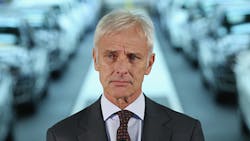Volkswagen AG CEO Matthias Mueller is pushing forward with a technological and organizational revamp of Europe’s largest carmaker despite internal opposition and expects his efforts to begin bearing fruit in two to three years.
“Some believe this will pass eventually, that Mueller will only be there for five years, then there’s a new boss and when the emissions crisis is over, we’ll be doing better anyway,” Mueller told reporters. “That’s not the case. Regardless of the emissions crisis, this company must reform itself and align for the future.”
VW’s management board is working on about 60 projects to overhaul the German automaker, including a cultural shift to get the company’s 12 brands and numerous divisions to cooperate, as it retools for technological change and seeks to recover from the emissions-heating crisis, Mueller said at a briefing late Monday in Hamburg.
The diesel-engine manipulation scandal that erupted last September pushed Volkswagen to accelerate a reorganization it was preparing amid a broad industry shift toward electric vehicles with new digital features like automated driving. VW invested $300 million in ride-hailing app Gett this year and is establishing a business unit focusing on new mobility offerings to expand beyond traditional manufacturing and selling of cars.
Cutting costs to revive profit at VW’s namesake brand, the company’s largest division by volume, is crucial for Mueller’s strategy, along with a reset of its operations in the U.S. Sales in North America tanked in the wake of the diesel-engine manipulation, which involves about 11 million cars worldwide. VW, which plans to introduce more than 30 electric cars by 2025 as production costs drop, anticipates sales of as many as 3 million battery-powered vehicles per year.
Mueller is struggling to shift a mammoth organization with 610,000 employees — more than any other automaker — centralized decision-making and a shareholder structure with various competing interests. Mueller, who would face opposition from the automaker’s powerful labor leaders to job cuts, said he’ll reduce headcount through natural attrition. Bernd Osterloh, Volkswagen’s works council chief and a supervisory board member, told Deutsche-Presse Agentur last weekend that there will be no forced layoffs on his watch.
Volkswagen’s three biggest investors control more than 80% of the voting stock, with the Porsche and Piech families owning the majority and the German state of Lower Saxony holding a 20% blocking stake. Representatives of those shareholders and labor leaders comprise the bulk of the carmaker’s supervisory board, the top body that approves executive strategy at German companies.
“VW’s management team seems to still be driven by external parties instead of taking matters into their own hands,” Arndt Ellinghorst, a London-based analyst for Evercore ISI wrote in a report to clients. “Lawyers, regulators, unions, politicians — there are still too many excuses for management to act slowly.”
Maintaining VW’s financial firepower is crucial both for investing in new technology and meeting the expenses triggered by the diesel scandal. VW has set aside about 17.8 billion euros ($19.85 billion) so far for fixing the affected cars and related legal risks.
“We have the whole world at our throats,” Mueller said. “We hope that it will come to a good end. Well, it’s not a good end anyway; it’s super expensive.”
Mueller said finger-pointing from other carmakers such as Renault SA during the diesel crisis made him feel angry at times.
“If they had kept their mouths shut, it would have been bearable, but to stand there and say: ‘Those baddies at Volkswagen’ and pretend everything is fine with them, that does hurt indeed,” Mueller said. “But that’s how things play out, and we’ll manage to get our act together.”
VW’s increased vulnerability amid the diesel crisis was highlighted this month when a dispute with parts supplier Prevent Group over a canceled contract escalated and production at six German factories ground to a halt before reaching an agreement. Mueller said VW’s purchasing strategy has been successful in the past but will be reviewed to reduce risks of further supply bottlenecks.
By Nicholas Brautlecht and Christoph Rauwald
About the Author
Bloomberg
Licensed content from Bloomberg, copyright 2016.
